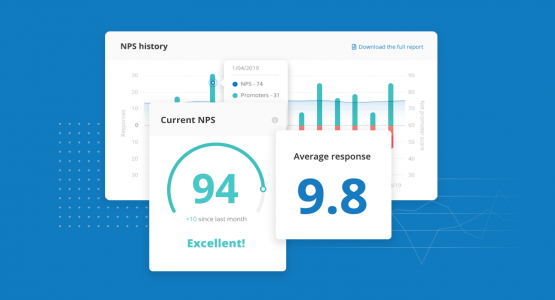Authored By: Carl Maerz
What Net Promoter Score (NPS) is and why it matters
Insurance agents interested in learning how their clients really feel about their agency use the NPS. It’s a fantastic strategy to collect honest feedback on what the agency is doing right and how they can get better. For agencies focused on improving the client experience, regular feedback from clients provides valuable direction and insight.
Discovering the NPS for a business has two steps: The first is to send brief survey to clients asking them how likely they are to recommend them from 0–10. When a client responds to an NPS survey they are grouped into three buckets: promoters (9–10), passives (7–8) and detractors (0–6). Promoters are likely to stick with a business and refer others, whereas passives and detractors are at risk of leaving.
Predicting exactly how a client will behave, though, depends on the industry and type of business. For example, most internet and cable providers are notorious for having terrible service, and therefore have lots of detractors. But because of limited competition and the effort required to switch providers, these unhappy clients are compelled to just stick with their lousy provider. Insurance agencies aren’t as lucky because switching insurance providers is relatively painless, especially if the relationship with the agent has distanced.
After surveying clients, the next step is to calculate the average of all the responses. This happens by tallying up the percentage of detractors and subtracting it from the percentage of promoters, giving a score from -100 to +100. A higher NPS means more promoters, and thus higher retention and more referrals. A lower NPS means more detractors, and more clients who are likely to leave by next year’s renewal. For insurance agencies specifically, every 5-point increase in their NPS translates to a 1% increase in client retention and a significant bump in client referrals, testimonials and online reviews.
Insurance agency NPS benchmarks
At Rocket Referrals we’ve collected millions of NPS surveys for insurance agencies to establish industry trends and best practices. We also created the only NPS leaderboard for insurance agencies where agents can find out how they rank among their peers.
Here is what our data shows: The average NPS for all P&C insurance agencies in the Unites States is 68. Most agencies that measure their NPS for the first time will be in this range. The average NPS for agencies with Rocket Referrals is 78. Agencies with an NPS of 90 or higher are in the top 2% of insurance agencies nationwide.
Here are the biggest factors that we found impact an agency’s NPS score:
- The agency is sending proactive and personal communication
Agencies with the highest client loyalty are reaching out to their clients proactively throughout the year. The most effective touchpoints are personal and meant to invest in the client relationship, instead of being merely promotional or transactional.
- The agency is acting on NPS responses
When a client responds to an NPS survey with anything other than a 9 or 10, the agency should follow up with them right away. A quick phone call doubles the chances of retaining them at renewal.
- The agency is making changes based on trends
Over half of clients that respond to an NPS survey will include a comment explaining their score. Agencies that study this feedback and take incremental steps to get better increase their NPS over time.
- The size of the agency
Small to medium sized insurance agencies have NPS averages 5 points higher than larger agencies. This is to be expected, as agents have less time to devote to each client as they grow. However, by investing in customer service, better processes and long-term client relationships, even larger agencies are able to maintain a high NPS over time.
- Personal vs commercial lines agencies
Commercial lines agencies have an NPS averages 6 points higher than personal lines. Early research attributes the higher scores to more agent involvement in helping business owners navigate risk and products, when compared to personal lines that are less specialized. Price is also less of an emotional trigger for businesses versus individuals and families.
Direct insurance carrier benchmarks
The most recent NPS average for P&C direct insurance carriers is 35. This may seem low, but carriers have increased their client loyalty by 40% over the last 5 years (from 25 to 35). Of course, insurance agencies still have a significant edge in their ability to foster personal relationships with clients, which reflects in higher loyalty and thus higher NPS scores. But carriers are making a real effort to improve the customer experience by investing heavily in better service and technology.
Other industry benchmarks
To provide some context on what an NPS score looks like in practice, here are some scores across other industries. Notice how the top companies’ scores are mostly in the 70s, which is on par with the average insurance agency. Also, no surprise that most people dislike their internet and TV provider.
- Investment companies (e.g. Merrill Lynch, Fidelity) have an industry average NPS of 40.
- Banks (e.g. Capital One, Wells Fargo) have an average NPS of 32.
- Retailers (e.g. Wal-Mart, Dollar Tree) have an average NPS of 35.
- Internet service providers (e.g. Comcast, Cox) have an average of -7.
- TV service providers (Direct TV, Dish) have an average of 11.
- Known industry leaders are Apple (72), JetBlue (71), Zappos (58), American Express (55), Ritz Carlton (68), Dish Network (17), USAA (73).


